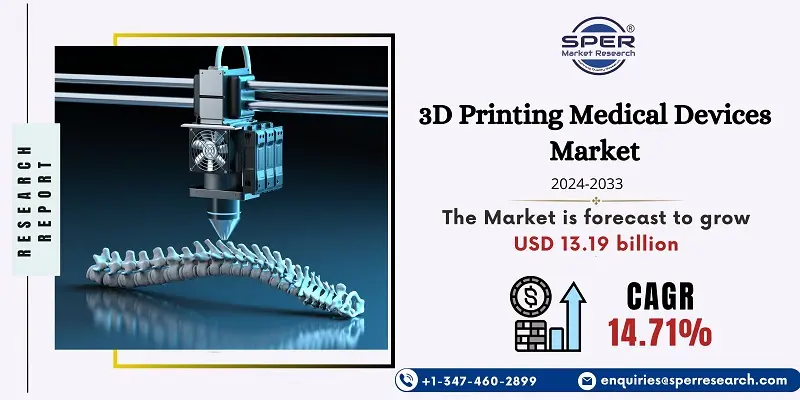
3D Printing Medical Devices Market Growth, Size, Trends, Demand, Revenue and Future Outlook
3D Printing Medical Devices Market Size- By Application, By End User, By Component, By Technology- Regional Outlook, Competitive Strategies and Segment Forecast to 2033
| Published: Mar-2024 | Report ID: MEDE2414 | Pages: 1 - 237 | Formats*: |
| Category : Medical Devices | |||
- Nov 2021: EOS has bought a share in Metalpine, an Austrian metal powder company. The goal of this acquisition is to collaborate closely on the creation of novel and sustainable metal powders.
- Oct 2021: The announcement was made by 3D Systems, Inc. to expand its tissue engineering and biology expertise by acquiring Volumetric Biotechnologies.


| Report Metric | Details |
| Market size available for years | 2020-2033 |
| Base year considered | 2023 |
| Forecast period | 2024-2033 |
| Segments covered | By Application, By Component, By End User, By Technology |
| Regions covered | North America, Asia-Pacific, Latin America, Middle East & Africa and Europe |
| Companies Covered | Autodesk Inc, Biomerics LLC, Desktop Metal Inc, EOS GmbH, General Electric Co., INTAMSYS TECHNOLOGY CO. LTD.,Medtronic Plc, Qualtech Consulting Corp. and Stratasys Ltd. . |
- Healthcare Institutions
- Medical Device Manufacturers
- Patients and Patient Advocacy Groups
| By Component: |
|
| By Application: |
|
| By End User: |
|
| By Technology: |
|
- Global 3D Printing Medical Devices Market Size (FY’2024-FY’2033)
- Overview of Global 3D Printing Medical Devices Market
- Segmentation of Global 3D Printing Medical Devices Market By Component (3D Bioprinter, 3D Printer, Material Software, Service.)
- Segmentation of Global 3D Printing Medical Devices Market By Application (Implant, Prosthetics and Surgical Guides.)
- Segmentation of Global 3D Printing Medical Devices Market By End User (Hospitals and Research Centres)
- Segmentation of Global 3D Printing Medical Devices Market By Technology (DLP, DLMS, EBM, Polyjet, SLS, SLA.)
- Statistical Snap of Global 3D Printing Medical Devices Market
- Expansion Analysis of Global 3D Printing Medical Devices Market
- Problems and Obstacles in Global 3D Printing Medical Devices Market
- Competitive Landscape in the Global 3D Printing Medical Devices Market
- Impact of COVID-19 and Demonetization on Global 3D Printing Medical Devices Market
- Details on Current Investment in Global 3D Printing Medical Devices Market
- Competitive Analysis of Global 3D Printing Medical Devices Market
- Prominent Players in the Global 3D Printing Medical Devices Market
- SWOT Analysis of Global 3D Printing Medical Devices Market
- Global 3D Printing Medical Devices Market Future Outlook and Projections (FY’2024-FY’2033)
- Recommendations from Analyst
1.1. Scope of the report1.2. Market segment analysis
2.1. Research data source2.1.1. Secondary Data2.1.2. Primary Data2.1.3. SPER’s internal database2.1.4. Premium insight from KOL’s2.2. Market size estimation
2.2.1. Top-down and Bottom-up approach2.3. Data triangulation
4.1. Driver, Restraint, Opportunity and Challenges analysis4.1.1. Drivers4.1.2. Restraints4.1.3. Opportunities4.1.4. Challenges4.2. COVID-19 Impacts of the Global 3D Printing Medical Devices Market
5.1. SWOT Analysis5.1.1. Strengths5.1.2. Weaknesses5.1.3. Opportunities5.1.4. Threats5.2. PESTEL Analysis5.2.1. Political Landscape5.2.2. Economic Landscape5.2.3. Social Landscape5.2.4. Technological Landscape5.2.5. Environmental Landscape5.2.6. Legal Landscape5.3. PORTER’s Five Forces5.3.1. Bargaining power of suppliers5.3.2. Bargaining power of buyers5.3.3. Threat of Substitute5.3.4. Threat of new entrant5.3.5. Competitive rivalry5.4. Heat Map Analysis
6.1. Global 3D Printing Medical Devices Market Manufacturing Base Distribution, Sales Area, Product Type6.2. Mergers & Acquisitions, Partnerships, Product Launch, and Collaboration in Global 3D Printing Medical Devices Market
7.1. Global 3D Printing Medical Devices Market Value Share and Forecast, By Component, 2024-20337.2. 3D Bioprinter7.3. 3D Printer7.4. Material Software
7.5. Service
8.1. Global 3D Printing Medical Devices Market Value Share and Forecast, By Application, 2024-20338.2. Implant8.3. Prosthetics8.4. Surgical Guides
9.1. Global 3D Printing Medical Devices Market Value Share and Forecast, By End User, 2024-20339.2. Hospitals9.3. Research Centres
10.1. Global 3D Printing Medical Devices Market Value Share and Forecast, By Technology, 2024-203310.2. DLP10.3. DLMS10.4. EBM10.5. Polyjet10.6. SLS
10.7. SLA
11.1. Global 3D Printing Medical Devices Market Size and Market Share
12.1. Global 3D Printing Medical Devices Market Size and Market Share By Component (2020-2026)
12.2. Global 3D Printing Medical Devices Market Size and Market Share By Component (2027-2033)
13.1. Global 3D Printing Medical Devices Market Size and Market Share By Application (2020-2026)13.2. Global 3D Printing Medical Devices Market Size and Market Share By Application (2027-2033)
14.1. Global 3D Printing Medical Devices Market Size and Market Share By End User (2020-2026)14.2. Global 3D Printing Medical Devices Market Size and Market Share By End User (2027-2033)
15.1. Global 3D Printing Medical Devices Market Size and Market Share By Technology (2020-2026)15.2. Global 3D Printing Medical Devices Market Size and Market Share By Technology (2027-2033)
16.1. Global 3D Printing Medical Devices Market Size and Market Share By Region (2020-2026)16.2. Global 3D Printing Medical Devices Market Size and Market Share By Region (2027-2033)16.3. Asia-Pacific16.3.1. Australia16.3.2. China16.3.3. India16.3.4. Japan16.3.5. South Korea16.3.6. Rest of Asia-Pacific16.4. Europe16.4.1. France16.4.2. Germany16.4.3. Italy16.4.4. Spain16.4.5. United Kingdom16.4.6. Rest of Europe16.5. Middle East and Africa16.5.1. Kingdom of Saudi Arabia16.5.2. United Arab Emirates16.5.3. Rest of Middle East & Africa16.6. North America16.6.1. Canada16.6.2. Mexico16.6.3. United States16.7. Latin America16.7.1. Argentina16.7.2. Brazil16.7.3. Rest of Latin America
17.1. Autodesk Inc17.1.1. Company details17.1.2. Financial outlook17.1.3. Product summary17.1.4. Recent developments17.2. Biomerics LLC17.2.1. Company details17.2.2. Financial outlook17.2.3. Product summary17.2.4. Recent developments17.3. Desktop Metal Inc17.3.1. Company details17.3.2. Financial outlook17.3.3. Product summary17.3.4. Recent developments17.4. EOS GmbH17.4.1. Company details17.4.2. Financial outlook17.4.3. Product summary17.4.4. Recent developments17.5. Formlabs Inc.17.5.1. Company details17.5.2. Financial outlook17.5.3. Product summary17.5.4. Recent developments17.6. General Electric Co.17.6.1. Company details17.6.2. Financial outlook17.6.3. Product summary17.6.4. Recent developments17.7. INTAMSYS TECHNOLOGY CO. LTD.17.7.1. Company details17.7.2. Financial outlook17.7.3. Product summary17.7.4. Recent developments17.8. Medtronic Plc17.8.1. Company details17.8.2. Financial outlook17.8.3. Product summary17.8.4. Recent developments17.9. Qualtech Consulting Corp.17.9.1. Company details17.9.2. Financial outlook17.9.3. Product summary17.9.4. Recent developments17.10. Stratasys Ltd.17.10.1. Company details17.10.2. Financial outlook17.10.3. Product summary17.10.4. Recent developments17.11. Others
SPER Market Research’s methodology uses great emphasis on primary research to ensure that the market intelligence insights are up to date, reliable and accurate. Primary interviews are done with players involved in each phase of a supply chain to analyze the market forecasting. The secondary research method is used to help you fully understand how the future markets and the spending patterns look likes.
The report is based on in-depth qualitative and quantitative analysis of the Product Market. The quantitative analysis involves the application of various projection and sampling techniques. The qualitative analysis involves primary interviews, surveys, and vendor briefings. The data gathered as a result of these processes are validated through experts opinion. Our research methodology entails an ideal mixture of primary and secondary initiatives.



Frequently Asked Questions About This Report
PLACE AN ORDER
Year End Discount
Sample Report
Pre-Purchase Inquiry
NEED CUSTOMIZATION?
Request CustomizationCALL OR EMAIL US
100% Secure Payment






Related Reports
Our Global Clients
Our data-driven insights have influenced the strategy of 200+ reputed companies across the globe.




















